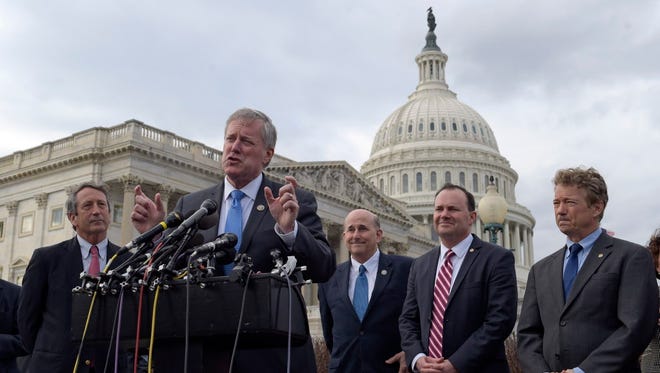Obamacare lives, but for how long?: Other views
What people are saying about the Republican American Health Care Act.

EJ Montini, The Arizona Republic: “The art of the deal isn’t exactly the same as the art of the bill. When it came down to it, President Trump figured he could strong-arm members of his own party the way he may have bullied stooges in the boardroom. Didn’t happen.”
Trump's new health care opportunity: Our view
The Register-Guard, Eugene, Ore., editorial: “The Germans have a word for it: schadenfreude, or taking pleasure in the misfortune of others. Democrats in Congress had that feeling Friday when the Republican substitute for the Affordable Care Act went down like something else of German origin, the Hindenburg. But Democrats should not savor the GOP disaster for long. The ACA, or Obamacare, has survived, but it’s in poor health, and needs improvements that seven years of partisan gridlock have prevented.”
Liz Peek, Fox News: “It is hard to overestimate the damage the Freedom Caucus has done to the fledgling presidency of Donald Trump, and to the country. By blocking the American Health Care Act (AHCA), the conservative group has guaranteed that Americans will struggle forward under the burden of Obamacare. In the next few months, insurers will announce their premium hikes for the coming year. Chances are, given the continuing withdrawal of major companies from the marketplaces and the ongoing failure of the bill to attract enough young and healthy participants, the new rates will not be pretty. Last year premiums went up 25%; it’s likely the increases will be higher this year.”
Rep. Mark Meadows, chairman of the House Freedom Caucus, This Week: “This is not the end of the debate. ... I had one of my friends (saying it’s like) Tom Brady lost at half time. We’re not — we may be in overtime, but I can tell you at the very end of the day, the most valuable player will be President Trump on this, because he will deliver. He’s committed to the American people. And we’re committed to helping get there.”
Jake Sherman, Anna Palmer, Daniel Lippman, Politico: “The Freedom Caucus has 30 or so members, which is more than enough to stop any and all of Trump’s legislative priorities. So, unless Trump moves to the left and starts working with Democrats, he cannot pass bills without the caucus. Or, Trump — with the assistance of Capitol Hill leaders — can try to split the group apart on an issue-by-issue basis. The government is slated to shut down at the end of April. The House — where funding the government will be most difficult — is only in session for 12 more days between now and then. (The House is out from April 7 through April 25.)”
Jonathan Allen, Roll Call: “There’s exactly one big winner in the Republican leadership right now: Senate Majority Leader Mitch McConnell. ... When Trump and House Speaker Paul Ryan promised that they would finally deliver on the GOP’s promise to repeal and replace Obamacare, McConnell sat back. ... One sign of the difficulty of the task they undertook: The chief cheerleaders for the bill were Vice President Pence, Office of Management and Budget Director Mick Mulvaney and Health and Human Services Secretary Tom Price, none of whom would have voted for it when they served in the House. ... Now, with everyone else in the Republican leadership looking impotent, McConnell is untarnished by the Obamacare repeal effort — and so are his GOP Senate colleagues. If you want to know what Congress will or won’t do, watch McConnell.”
Laurie Garrett, CNN: “Hidden in the nooks and crannies of the AHCA was a provision to eliminate $1 billion in disease prevention funds from the Centers for Disease Control and Prevention: Those cheers I imagine I hear right now in Atlanta are huzzahs from the CDC headquarters. ... The CDC used those funds to support everything from diabetes diagnosis and care programs to elimination of lead poisoning.”
Adam Davidson, The New Yorker: “When a person has some money, they can do one of two things: Invest it, or use it to buy something they want to consume. ... Health care is typically classified as a form of consumption. But if my relative spent some of his money with a back-pain specialist, who could teach him exercises that would prolong his working life by another decade, shouldn’t that be considered an investment? ... Sometimes the debates about health care in Washington can seem absurd, as if politicians have the ability to engineer our health economy with precision. The truth is that no matter what insurance schemes are designed by Congress, we cannot avoid sharing the costs and benefits of health care. If we deny someone care today, we will be paying that cost later, in the form of more expensive treatment or lost years of productive employment. If we make health care less available, we will all live in a poorer nation.”
Glenn Harlan Reynolds, University of Tennessee law professor: “The Republican inability to deliver a bill that could get a majority in the GOP-led House is a colossal failure, and pretty much undercuts its entire reason for being. For years, the congressional GOP leadership failed to deliver on promises to constituents, and offered the excuse that it couldn’t do anything without control of the White House. Well, they’ve got that, so what’s their excuse now? And where are the bills on infrastructure, on tax reform, on free speech? ... When President Obama turned out not to be quite the miracle-working messiah that some of his fans thought he’d be, Democratic pundits started producing thumb-sucking pieces to the effect that America had become ‘ungovernable.’ (But) America is being governed pretty well at the state level, mostly by Republicans.”